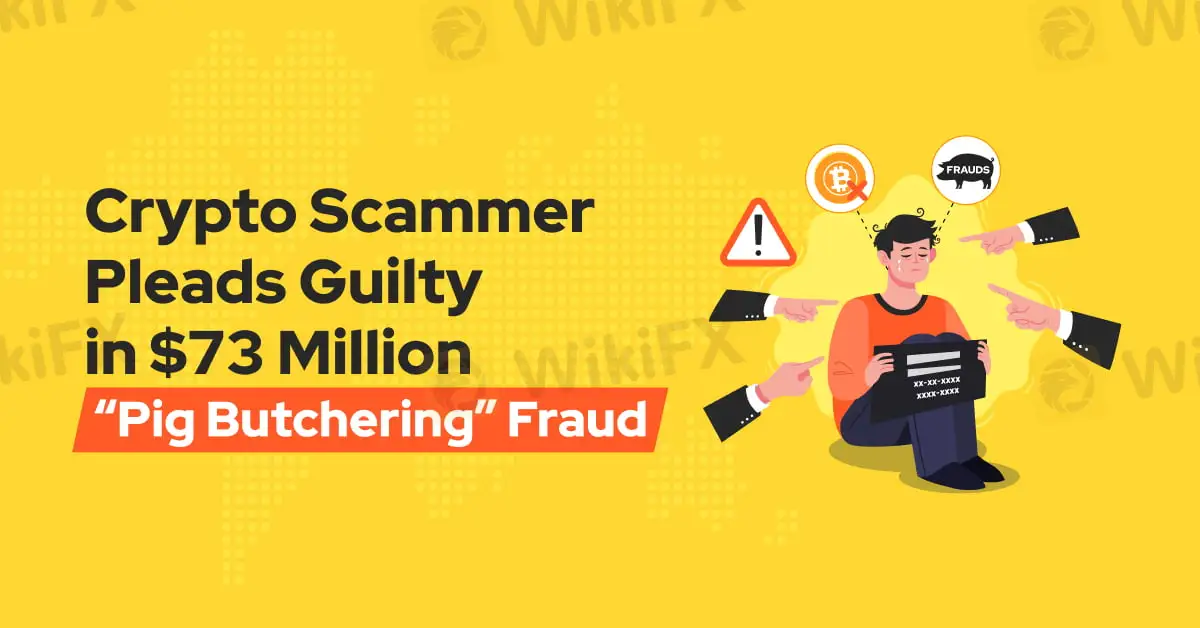简体中文
繁體中文
English
Pусский
日本語
ภาษาไทย
Tiếng Việt
Bahasa Indonesia
Español
हिन्दी
Filippiiniläinen
Français
Deutsch
Português
Türkçe
한국어
العربية
Crypto Scammer Pleads Guilty in $73 Million “Pig Butchering” Fraud
Abstract:The scammer behind a $73 million pig butchering scheme has pleaded guilty to defrauding victims through fake cryptocurrency investments.

Daren Li, a 41-year-old dual citizen of China and St. Kitts and Nevis, has pleaded guilty to conspiracy to commit money laundering connected to a massive cryptocurrency fraud scheme. Known as a “pig butchering” scam, the scheme lured unsuspecting victims into fake digital currency investments, ultimately defrauding them of approximately $73.6 million, as reported by the U.S. Department of Justice (DOJ).
The scam, one of the largest of its kind, used a tactic where Li and his accomplices built trust with victims over time. Typically, “pig butchering” scams begin with scammers forming what seem to be genuine relationships online, sometimes posing as romantic interests or friends. After establishing trust, they persuade victims to invest significant sums into fictitious ventures, only to vanish with the funds. In this case, authorities reported that much of the stolen money ended up with transnational criminal organisations in countries like Myanmar and Cambodia, where trafficked individuals were allegedly forced into labour to further these schemes.

Li orchestrated this operation from outside the United States, relying on a network of accomplices to open U.S. bank accounts under fake business names. Once funds were transferred from victims, they were quickly converted to the stablecoin Tether (USDT) and moved to cryptocurrency wallets controlled by Li‘s team, making the funds difficult to trace. Despite these efforts to remain hidden, Li was apprehended at Atlanta’s Hartsfield-Jackson International Airport in April and now faces sentencing in California on 3 March 2025. He could face up to 20 years in prison.
This case underscores the vulnerabilities of the cryptocurrency market, where anonymity and global reach provide an attractive setting for fraud. The DOJ and other authorities warn that the rising sophistication of these scams, often linked to international crime rings, makes them particularly challenging to investigate, leaving victims with little hope of recovering their lost investments.

To protect themselves, potential investors are encouraged to use tools like WikiFX, which offers detailed insights on brokers, including regulatory status and customer reviews. By providing essential information, risk alerts, and safety ratings, platforms like WikiFX empower investors to verify the legitimacy of any investment platform before committing their funds. With these tools, investors can reduce the risk of falling prey to sophisticated scams.

Disclaimer:
The views in this article only represent the author's personal views, and do not constitute investment advice on this platform. This platform does not guarantee the accuracy, completeness and timeliness of the information in the article, and will not be liable for any loss caused by the use of or reliance on the information in the article.
Read more

TriumphFX Rebrands to Continue Global Fraud: Over RM80 Million Lost
The notorious forex investment company TriumphFX, previously exposed for running a global scam operation for over a decade, is now being accused of rebranding itself to continue defrauding unsuspecting investors. Despite being unregulated and based offshore in Seychelles, TriumphFX has actively targeted Malaysian investors, luring them with false promises and eventually converting funds into cryptocurrency, making recovery nearly impossible.

TriumphFX Faces 29 Exposure Reviews on WikiFX
TriumphFX faces scrutiny with 29 exposure reviews on WikiFX, revealing regulatory warnings from ID BAPPEBTI, VU VFSC, SG MAS, and MY SCM, plus user complaints about withdrawal issues and fraud concerns.

What WikiFX Found When It Looked Into Exclusive Markets
In the fast-growing world of online trading, security and regulation are essential. One company now raising questions in this space is Exclusive Markets, a broker claiming to be regulated, but scrutiny of its licence and operations suggests a more complex picture.

TriumphFX Review 2025: A Safe Bet or a Risky Trap?
Is TriumphFX a trustworthy broker or a scam in 2025? This review explores its regulation, withdrawal issues, and more to help you decide if it's a safe bet or a risky trap.
WikiFX Broker
Latest News
SkyLine Guide 2025 Malaysia: 100 Esteemed Judges Successfully Assembled
Vantage Markets Review 2025: Trusted Forex and CFD Trading Since 2009
Why STARTRADER Is Popular Among Traders?
A Guide to Intraday Forex Trading You Can't Miss Out
CONSOB Blocks Access to 13 Unauthorized Investment Websites
TradingPRO: A Closer Look at Its Licences
The world could be facing another ‘China shock,’ but it comes with a silver-lining
New SEBI Regulations on Intraday Trading
Everything You need to know about Barath Trade
IronFX Broker Review 2025: A Comprehensive Analysis of Trustworthiness and Performance
Currency Calculator


